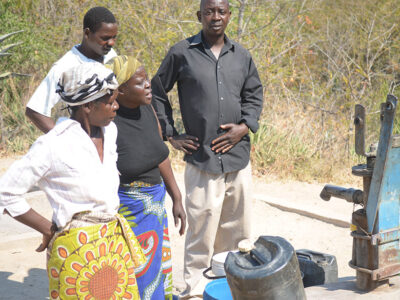Source: Groundwater Crisis in Zimbabwe Brought On by Droughts – Eos

Anna Brazier, an independent climate change researcher and consultant based in Zimbabwe, said that although drought years are part of the normal climate cycle in this part of Africa—often associated with the well-known El Niño–Southern Oscillation—global warming is causing droughts to become more frequent, more intense, and less predictable. “Models predict an average rainfall decline across Zimbabwe by between 5% and 18% by the end of the century. The range is large because different models give different results,” Brazier said.
Richard Taylor, a professor of hydrogeology at University College London, in a report identified groundwater as an important and climate-resilient source of freshwater. Depletion of groundwater is especially relevant for tropical countries like Zimbabwe.
“As the world warms, amplification of rainfall extremes and its consequences will be most pronounced in the tropics where, by 2050, over half of the world’s population is projected to live. Yet it is here where substantial increases in freshwater withdrawals are required to achieve United Nations Sustainable Development Goals (SDGs) of enhancing food security through irrigation,” Taylor wrote in the report.
Amid the current prolonged drought in Zimbabwe, which started in 2018, fears abound that the boreholes that still have water will dry up before the start of the next rainy season in November or December.
“Water shortages are getting worse with each passing day,” said Danai Mutoro, a farmer in Chitora, a small farming village about 50 kilometers south of Zimbabwe’s eastern border city of Mutare. “We were expecting better rainfall during the 2019–2020 summer season; instead, the season was even worse than before.”Lovemore Muradzikwa, a farmer in Mafuke, a farming community on the outskirts of Mutare, said water shortages in his area have now reached critical levels.
“We are now strictly rationing the little water still available. Each household is getting only 20 liters of water per day for cooking and other household uses regardless of the size of a family,” Muradzikwa said.
Across Zimbabwe, more than 38% of the population depends on groundwater for household, agricultural, and industrial use.
Use Water Resources Sustainably
Washington Zhakata, director of climate change management in Zimbabwe’s Ministry of Lands, Agriculture, Water, Climate and Rural Resettlement, explained that underground water is recharged by normal seasonal rains, and Zimbabwe is getting less seasonal rainfall. The country has suffered severe recurrent droughts since 1992.
“In long periods of droughts, there is a higher risk of depletion of aquifers, especially in cases of small and shallow aquifers. People in water-scarce areas will increasingly depend on groundwater because of its buffer capacity,” said Zhakata. “And when it rains these days, it’s so intense [as] not to allow gradual seepage of the water to lower depths. Water is then lost as runoff into the streams and straight to the nearby ocean.”
Seasonal rainfall has also not been consistent across the country, Zhakata said. The provinces of Manicaland, Masvingo, Matabeleland North, and Matabeleland South have been hardest hit by shortages of intraseasonal rainfall. “Some other areas experiencing this problem [of groundwater shortages] are those areas close to urban areas where consumption of water is very high and a lot of boreholes have been sunk,” he added.Intensification of human activity (including agriculture and industry) and land use changes (including industrial agriculture and urbanization) increase the demand for groundwater.
“Strategic use of groundwater for food security in a changing climate is becoming more and more important. It is important for farmers to utilize water resources sustainably to allow water seepage to greater depths,” Zhakata said.
COMMENTS